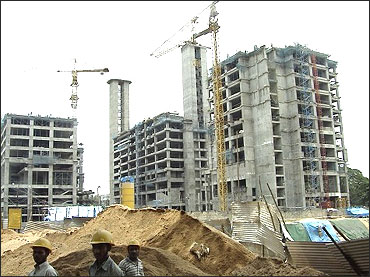 | « Back to article | Print this article |
Global investors renew interest in Indian realty
With their home markets in turmoil, large global investors such as Blackstone, Carlyle, Morgan Stanley, JP Morgan and the Government of Singapore Investment Corporation are actively scouting for and signing deals in the Indian property sector.
Take, for instance, the Carlyle Group, which has $153 billion in assets under management. The group invested $26 mn (Rs 117 crore) in former Citibanker Jaithirth Rao's low-cost housing project 'Vaibhava' in Bangalore.
The investment was made from the $1.04-bn Carlyle Asia Growth Partners IV (CAGP IV) fund.
Although Carlyle's investment in the Vaibhava project was its first in the Indian property sector, the group has been an active player in the real estate segment across many Asian countries, including China and South Korea, since the year 2000.
Click on NEXT for more...
Global investors renew interest in Indian realty
A Carlyle spokesperson said: "As you may notice, this investment was made from our growth capital fund because they see strong growth prospects in this company and the demand for affordable housing, rather than purely targeting the property sector, although this is indeed our first investment in the property sector."
Another global private equity (PE) giant, Blackstone, which gained exposure to Indian real estate through its 2008 investment in Synergy, a Bangalore-based architectural company, is looking for opportunities to invest in the property sector, said two executives privy to the talks.
In what could be its maiden investment in the Indian property sector, Blackstone is in advanced stages of negotiations with DLF, the country's largest realty company, to buy the latter's land in the information technology special economic zone in Pune for Rs 900 crore (Rs 9 billion).
Click on NEXT for more...
Global investors renew interest in Indian realty
Blackstone is also financing the Embassy group's purchase of 22 per cent stake in Manyata Business Park, Bangalore, for Rs 540 crore (Rs 5.4 billion).
"As a policy of the Blackstone Group, we do not comment on industry speculation," was the response of a public relations executive, when asked to confirm.
According to sources in the market, Morgan Stanley is looking to invest $100 mn in the Century Group, the Bangalore-based property developer.
Morgan Stanley made headlines in 2007 when it invested Rs 675 crore (Rs 6.75 billion) in Mumbai-based Oberoi Constructions, in one of the largest entity-level deals in real estate. An email to Morgan Stanley did not elicit any response.
Although the property market is abuzz with the news that JP Morgan has launched a $350-500 mn India-focused realty fund, a senior executive of the investor denied the development.
Click on NEXT for more...
Global investors renew interest in Indian realty
Background
The heightened activity by these investors comes after two years of exit or inactivity of global funds such as Wachovia, Citigroup, Goldman Sachs and Marathon, among others, in the Indian property sector after the global financial crisis in 2008-09.
"You can say it is a good coincidence of availability of capital and opportunities to invest," according to a senior executive of JP Morgan.
"There is a clear funding constraint because of high interest rates and provisioning for bank loans. It is an opportunity for investors at reasonable valuations."
Most of the investors exited or became inactive after the global financial crisis and collapse of Lehman Brothers in 2008. Lehman itself was one of the biggest investors in the Indian realty sector.
Click on NEXT for more...
Global investors renew interest in Indian realty
Also, the proposal from former US Federal Reserve chairman Paul Volcker played a role in global banks limiting their exposure in PE funds.
The Volcker rule specifically prohibits a bank or institution that owns a bank from engaging in proprietary trading that is not at the behest of its clients, and from owning or investing in a hedge fund or PE fund.
"Post the global financial crisis, it would have taken global investors a couple of years to reorganise themselves and raise fresh funds to invest.
For instance, Morgan Stanley raised $5 bn last year and there is an India allocation in that. Carlyle is looking at an IPO," said Amit Goenka, national director, Capital Transactions, Knight Frank, a global property consultant.
"Many global investors burnt their fingers during the boom of 2005-2008; they invested at high valuations but did not find any easy exits," said a senior realty fund manager who did not want to be named.
That made many of them cautious, he added.





